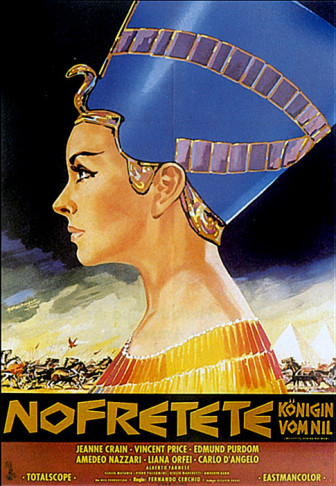Kevin Clarke
Operetta Research Center
9 March, 2016
The Oper Leipzig annouced its new season this week, including the program for the associated Musikalische Komödie. There is a true rarity among the upcoming titles: Nico Dostal’s Prinzessin Nofretete. A show that originally premiered in 1936 at the Cologne opera hourse, in the early days of the Nazi regime, with some pseudo-exotic Egyptian dances.

Poster for the 1961 movie “Nefertiti, regina del Nilo.”
You will recall, that Dostal’s most famous operetta Clivia was recently revived – very successfully – at the Komische Oper Berlin. The company turned this 1933 revue about a Hollywood diva caught up in an revolution in the South American jungle into a camp Roaring Twenties spectacle, with lots of cross-dressing and jazz elements, even though in reality Clivia is an early example of the new “Aryan” operetta ideal that substituted the “degenerate” jazz operettas of Paul Abraham, Bruno Granichstaedten, or Emmerich Kalman. Three years after Clivia, Dostal had established himself as one of the new and successful German language writers of the genre, and like many others his works were now presented in opera houses, to indicate their elevation to a higher artistic level. (Künneke’s Die große Sünderin was also premiered at an opera house with world-famous opera singers such as Tiana Lemnitz and Helge Roswaenge.)
Prinzessin Nofretete has been somewhat forgotten by post-war operetta fans and theater directors. It can be newly discovered and discussed next year, when Franziska Severin stages the work in Leipzig. Opening night will be March 25, 2017. Publisher Bloch Erben gives a summary of the plot (in German):
Es ist heiß in Ägypten und die Sonne scheint den Leuten ordentlich auf den Kopf. Trotzdem kommt das Team um den großen Archäologen Lord Callagan nicht umhin, sich über den neuesten Sensationsfund zu freuen: Die Grabkammer der Prinzessin Nofretete, Tochter des großen Pharao Rampsinit. In die allgemeine Freude stolpert mit großem Hallo die aufgedrehte Fremdenführerin Polli. Wie es der Zufall so will, erkennt sie in Callagans Assistent Totty ihren Verflossenen und ihr Herz fängt sofort wieder Feuer. Der gut betuchte Totty soll nun allerdings die Tochter des Chefs, die steinreiche Claudia heiraten – so will es Lord Callagans Businessplan. Claudia aber hat sich schon ganz und gar auf den unbetuchten, aber schlauen Hjalmar eingeschossen. Also läuft ein jeder erstmal verzweifelt verliebt und sinnlos die Stacheln einer Stachelgurke zupfend (Gänseblümchen gibt es nicht in Ägypten) durch die Wüste – bis Claudias äußerst kratzbürstiges Gebaren bei der unfreiwilligen Verkündung ihrer Verlobung den Wahrsager Abu auf den Plan ruft. Dieser orakelt, dass Claudia egal, was Callagan auch anstellt, auf jeden Fall das Schicksal der Prinzessin Nofretete ereilen wird. Wie dieses Schicksal aussieht, kann er allerdings nicht sagen, da müsste schon selbst jemand in die Grabkammer klettern und nachgucken. Callagan, der schon seine schönen Pläne platzen sieht, geht freiwillig und bekommt furchtbare Gewissheit. Dem Grab entstiegen und in die Londoner Heimat zurückgekehrt, veranstaltet er einen lustigen Theaterabend, um die Weissagung als Bühnenspektakel zu präsentieren. Natürlich schummelt er dabei und schreibt die Geschichte etwas um. Dummerweise nimmt die Wahrheit das Hintertürchen …
After Prinzessin Nofretete, Dostal presented the folkloristic “substitute operettas” Monika (1937) and Die ungarische Hochzeit (1938), as an Aryan alternative to the Hungarian flavored Kalman works taken out of circulation in Nazi Germany.
After the war, Dostal wrote Doktor Eisenbart for the Nuremberg opera house as a “Versuch eines Volks-Spectaculums für Schauspieler mit Bänkelsängern und Chansons“, as well as the „magical spectacle“ Der dritte Wunsch. Both demonstrate how low the genre had sunk after the National Socialists radically redefined it. Dostal recorded many of his works with famous post-war artists, many of this songs remain favorites with operetta singers. He died in 1981 at the age of 85 in Salzburg.

The Musikalische Komödie in Leipzig. (Photo: Dirk Brzoska)
Other new productions at the Musikalische Komödie include Gilbert & Sullivan’s Die Piraten (The Pirates of Penzance) directed by Cush Jung. Opening night is 8 October, 2016. Also, Thomas Hermanns will stage his show business parody Kein Pardon (6 May, 2017).
